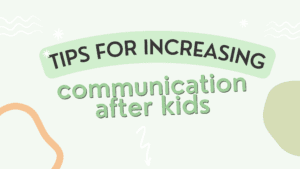Journey to Parenthood
We all know that pregnancy isn’t easy, but what about the next steps after the child arrives? After childbirth, you may notice that in addition to juggling your parental responsibilities, you also need to communicate differently with those around regarding your and your child’s needs.
In today’s blog article, we are going to discuss different communication techniques that you, the parent, can use post-childbirth. While we are going to emphasize communication strategies between parents of the child, we will also discuss ways to modify these strategies for other family members.
Setting Expectations + Simple Tips
Setting expectations surrounding raising a child is critical. However, once the child is born and the child’s needs and personality starts to emerge, you may come to the conclusion that those original ideas of parenting style need to pivot. If this applies to you, know that it is completely normal to have to pivot your parenting style as your child develops. Below are some simple tips to help you pivot:
- Schedule check-in times with the other parent of your child to discuss what you both feel is working well and what could be modified in your parenting styles.
- Analyze new strategies together. This can assist with both your parenting style, as well as improve on your communication with the other parent of your child, whether you are both coparenting or are actively in a relationship together.
- Set boundaries with other family members by sticking to what works best for you as the parent(s).
3 Areas to Discuss Together
Talk About How You Were Raised
Having open and vulnerable conversations about how you were raised can provide a lot of insight into your parenting style. It is common that how a person was raised as a child will impact how they parent. Their childhood experiences often shape what a person does and doesn’t want to do as a parent themselves.
- Talk about how you were both raised and how that impacts your views on parenting. Even if you have had these discussions in the past, it is important to revisit these conversations because things can change between envisioning having a child and the child actually arriving.
- Discuss this with other family members too. By having discussions about it, you may find that family member isn’t meaning to be malicious, but that is simply how they grew up and think it is beneficial. By creating empathic conversations, you may find it is easier to work towards solutions.
Plan What You Want to Say Ahead of Time
It can be very easy for conversations to derail! This is especially true when it comes to conversations about children. Comparisons may emerge or opinions can get quite strong when discussing the best practices for raising a child.
- Plan what you want to say ahead of time. For instance, you can keep a mental “bullet point list” of your boundaries regarding parenting, or if you need to have a conversation regarding your child have one or two main points you would like to address during the conversation. By having what you want to say laid out ahead of time, you can keep the conversation focused and on-task. Feel free to additionally lay out boundaries if the topic strays.
Don’t Hide Your Feelings
The last strategy we are going to discuss is to be open and honest about your feelings. Unfortunately, there is a large misconception that it is important to suppress negative emotions around children. While there is a time and a place for what a child is exposed to, you should not limit the expression of how you feel around other adults.
- As the parent(s), make space for each other to process. This can be done individually first and then coming together to share the highs and lows you are facing.
Next Steps
The birth of a child, while exciting, also comes with many other emotions including, but not limited to, anxiety and even sorrow. This can occur for either the birthing or non-birthing parent, but it is also important to note that biological factors can contribute to emotional symptoms in birthing parent.
What is critical is to meet yourself with where you are at. If you find yourself feeling down after your child is born, it is important to not be hard on yourself for feeling that way. Instead, we encourage you to be open and honest about how you feel and what you need. This can also be discussed with a trained therapist.
Here at online-therapy.com we have therapists who specialize in parenting-related needs. We also now offer couples counseling for parents who are struggling. This is not limited to parents in an active relationship, as we also offer services for co-parenting.





Leave A Comment